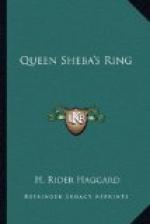This so-called gate was the upper mouth of the pass whence first we saw, lying beneath us, the vast, mountain-ringed plain beyond. It was a beautiful sight in the sunshine. Almost at our feet, half-hidden in palms and other trees, lay the flat-roofed town itself, a place of considerable extent, as every house of any consequence seemed to be set in a garden, since here there was no need for cramping walls and defensive works. Beyond it to the northward, farther than the eye could reach, stretching down a gentle slope to the far-off shores of the great lake of glistening water, were cultivated fields, and amongst them villas and, here and there, hamlets.
Whatever might be the faults of the Abati, evidently they were skilled husbandsmen, such as their reputed forefathers, the old inhabitants of Judaea, must have been before them, for of that strain presumably some trace was still present in their veins. However far he may have drifted from such pursuits, originally the Jew was a tiller of the soil, and here, where many of his other characteristics had evaporated under pressure of circumstances—notably the fierce courage that Titus knew—this taste remained to him, if only by tradition.
Indeed, having no other outlet for their energies and none with whom to trade, the interests of the Abati were centred in the land. For and by the land they lived and died, and, since the amount available was limited by the mountain wall, he who had most land was great amongst them, he who had little land was small, he who had no land was practically a slave. Their law was in its essentials a law of the land; their ambitions, their crimes, everything to do with them, were concerned with the land, upon the produce of which they existed and grew rich, some of them, by means of a system of barter. They had no coinage, their money being measures of corn or other produce, horses, camels, acres of their equivalent of soil, and so forth.
And yet, oddly enough, their country is the richest in gold and other metals that I have ever heard of even in Africa—so rich that, according to Higgs, the old Egyptians drew bullion from it to the value of millions of pounds every year. This, indeed, I can well believe, for I have seen the ancient mines which were worked, for the most part as open quarries, still showing plenty of visible gold on the face of the slopes. Yet to these alleged Jews this gold was of no account. Imagine it; as Quick said, such a topsy-turvy state of things was enough to make a mere Christian feel cold down the back and go to bed thinking that the world must be coming to an end.
To return, the prince Joshua, who appeared to be generalissimo of the army, in what was evidently a set phrase, exhorted the guards at the last gates to be brave and, if need were, deal with the heathen as some one or other dealt with Og, King of Bashan, and other unlucky persons of a different faith. In reply he received their earnest congratulations upon his escape from the frightful dangers of our journey.




